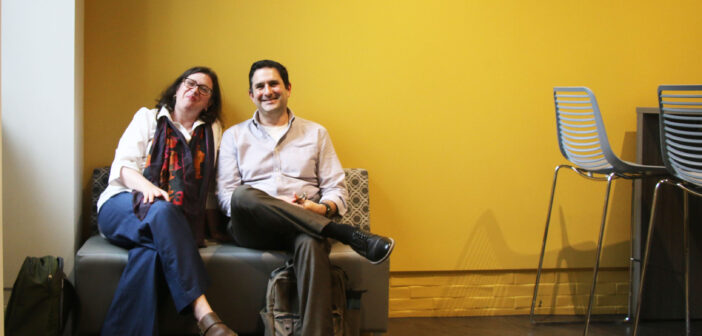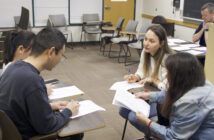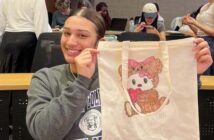Some courses at Lehigh are co-taught, meaning two professors lecture and guide the class through its content. And just as any other co-teaching pair has meetings to discuss their course, two professors this semester debrief their course — but at a shared dinner table.
Algorithms and Social Justice: a cross-listed women, gender and sexuality studies and industrial and systems engineering course, is being taught for the second time by professors Suzanne Edwards and Larry Snyder. While interdisciplinary courses and majors are not uncommon at Lehigh, what makes this class unique is the professors are a married couple.
After first meeting in an undergraduate Chaucer poetry class at Amherst College, Snyder called Edwards for help with the homework. Snyder insists he understood the homework but asked anyway.
Edwards and Snyder got married in 1998 and both began teaching at Lehigh in 2003. Edwards started as an adjunct professor in the English department, while Snyder was a tenure-track professor in the industrial and systems engineering department.
Now, Edwards is an associate professor of English in addition to women, gender and sexuality studies, splitting her time between the two fields. Snyder is a professor of industrial and systems engineering and the director of the Institute for Data, Intelligent Systems and Computation.
After a student in Edwards’ Introduction to Gender Studies class brought to her attention an article about an algorithm that could scan scripts for bias, a conversation between Edwards and Snyder spawned about the concept of algorithms and social justice.
Edwards read the article and felt the concept didn’t make sense, but she said she didn’t have a reason or understanding to explain why. When she showed Snyder the article, he was able to explain some of the technical reasoning for its effectiveness.
Edwards and Snyder realized from that conversation they wanted humanities students to have technical competence and engineers to have knowledge about critical race theory, feminist theory, queer theory, disability studies and more.
“One of the motivating factors for the class is that humanists should be thinking about tech from the get-go and tech folks should be thinking about humanities from the get-go,” Snyder said. “It should not be an afterthought for either type of discipline.”
The couple wanted a course that was accessible to students who have not taken humanities classes at Lehigh and also to students who have never coded before.
According to Snyder, it took about three years to take the class from a concept to reality, and the class was first taught in the fall of 2022.
Edwards and Snyder said they had to start from scratch when building the course to ensure it was equal parts computing and humanities. They said it is a combination of readings and discussion, with coding components as well.
Once the course was created, the couple began the next step: co-teaching.
Edwards has previously co-taught with English professor Mary Foltz. Edwards said teaching Algorithms and Social Justice has been similar, but the one difference she has noticed is the couple’s relationship allows them to “read each others’ minds.”
“I think from the students’ point of view, some of that comes through — just the fact that there’s a sort of seamlessness between us in the classroom that probably isn’t there for some other co-teachers,” Snyder said. “There’s also little jokes about our kids or our cat, but that’s icing.”
The course has 18 students enrolled this semester.
Kyla Branco, ‘25, an IDEAS major, said this was her first co-taught course at Lehigh and she appreciates Edwards and Snyder’s unique personal working relationship.
She said they work well together during class.
“They supplement each other really well,” Branco said. “Where one of them lacks, the other one picks up.”
While Edwards and Snyder have been enjoying the new experience of working together, Snyder makes clear he would not recommend working with a spouse in general.
“I think it has worked very well for us just because of the particular ways that we’re complementary and that we work together,” Snyder said. “It could go very, very wrong if that’s just not the way the couple interacts…it turned out we really enjoyed it.”
Edwards said while people have told the couple they could not imagine working with their spouse, they haven’t had any conflict surrounding the class.
The two have also noticed they talk about the class all the time — at school, at home and everywhere in between.
“There is a way in which it does kind of take over,” Edwards said. “But that’s also because we genuinely enjoy talking about it.”






Comment policy
Comments posted to The Brown and White website are reviewed by a moderator before being approved. Incendiary speech or harassing language, including comments targeted at individuals, may be deemed unacceptable and not published. Spam and other soliciting will also be declined.
The Brown and White also reserves the right to not publish entirely anonymous comments.